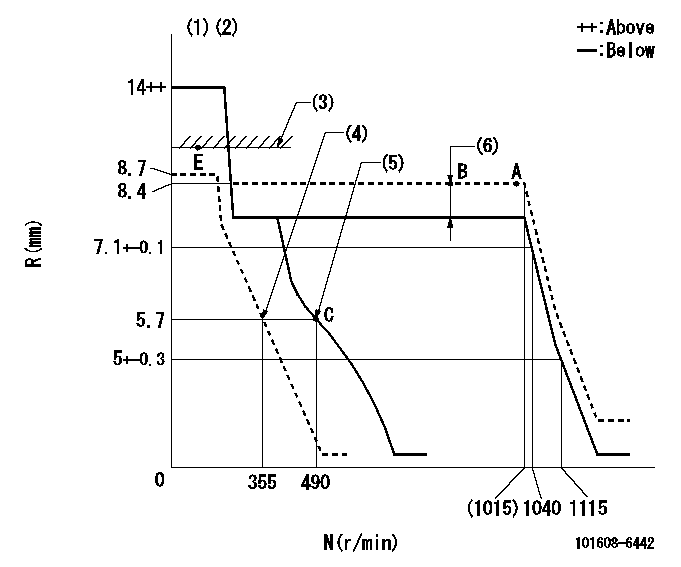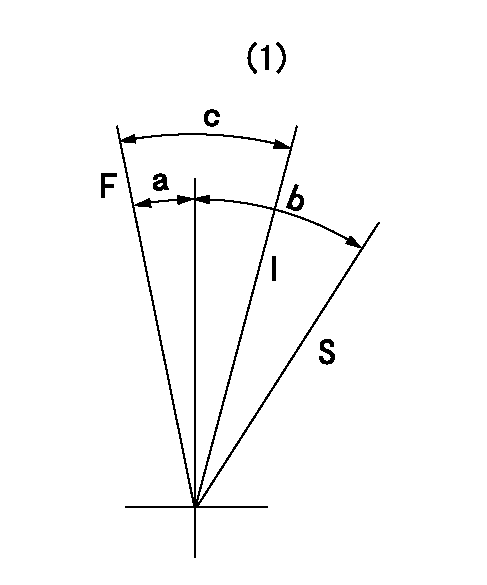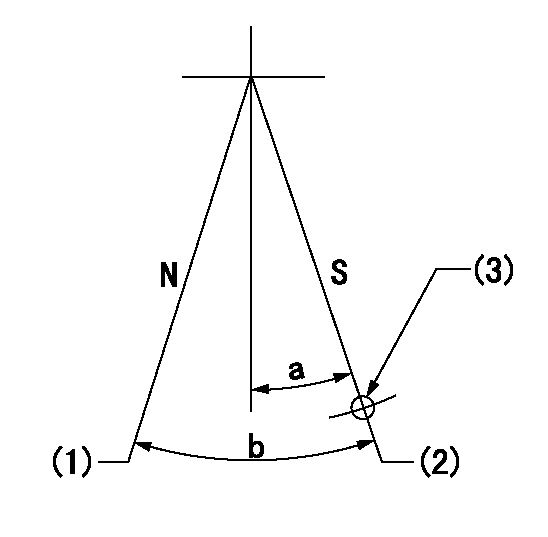Information injection-pump assembly
BOSCH
9 400 613 106
9400613106
ZEXEL
101608-6442
1016086442

Rating:
Service parts 101608-6442 INJECTION-PUMP ASSEMBLY:
1.
_
6.
COUPLING PLATE
7.
COUPLING PLATE
8.
_
9.
_
11.
Nozzle and Holder
ME440837
12.
Open Pre:MPa(Kqf/cm2)
21.6{220}
15.
NOZZLE SET
Include in #1:
101608-6442
as INJECTION-PUMP ASSEMBLY
Include in #2:
104740-0434
as _
Cross reference number
BOSCH
9 400 613 106
9400613106
ZEXEL
101608-6442
1016086442
Zexel num
Bosch num
Firm num
Name
Calibration Data:
Adjustment conditions
Test oil
1404 Test oil ISO4113 or {SAEJ967d}
1404 Test oil ISO4113 or {SAEJ967d}
Test oil temperature
degC
40
40
45
Nozzle and nozzle holder
105780-8140
Bosch type code
EF8511/9A
Nozzle
105780-0000
Bosch type code
DN12SD12T
Nozzle holder
105780-2080
Bosch type code
EF8511/9
Opening pressure
MPa
17.2
Opening pressure
kgf/cm2
175
Injection pipe
Outer diameter - inner diameter - length (mm) mm 6-2-600
Outer diameter - inner diameter - length (mm) mm 6-2-600
Overflow valve
131424-5520
Overflow valve opening pressure
kPa
255
221
289
Overflow valve opening pressure
kgf/cm2
2.6
2.25
2.95
Tester oil delivery pressure
kPa
255
255
255
Tester oil delivery pressure
kgf/cm2
2.6
2.6
2.6
Direction of rotation (viewed from drive side)
Right R
Right R
Injection timing adjustment
Direction of rotation (viewed from drive side)
Right R
Right R
Injection order
1-5-3-6-
2-4
Pre-stroke
mm
3.5
3.45
3.55
Beginning of injection position
Drive side NO.1
Drive side NO.1
Difference between angles 1
Cal 1-5 deg. 60 59.5 60.5
Cal 1-5 deg. 60 59.5 60.5
Difference between angles 2
Cal 1-3 deg. 120 119.5 120.5
Cal 1-3 deg. 120 119.5 120.5
Difference between angles 3
Cal 1-6 deg. 180 179.5 180.5
Cal 1-6 deg. 180 179.5 180.5
Difference between angles 4
Cyl.1-2 deg. 240 239.5 240.5
Cyl.1-2 deg. 240 239.5 240.5
Difference between angles 5
Cal 1-4 deg. 300 299.5 300.5
Cal 1-4 deg. 300 299.5 300.5
Injection quantity adjustment
Adjusting point
A
Rack position
8.4
Pump speed
r/min
1000
1000
1000
Average injection quantity
mm3/st.
88
87
89
Max. variation between cylinders
%
0
-2.5
2.5
Basic
*
Fixing the lever
*
Boost pressure
kPa
66
66
Boost pressure
mmHg
495
495
Injection quantity adjustment_02
Adjusting point
-
Rack position
6+-0.5
Pump speed
r/min
490
490
490
Average injection quantity
mm3/st.
8
6.7
9.3
Max. variation between cylinders
%
0
-14
14
Fixing the rack
*
Boost pressure
kPa
0
0
0
Boost pressure
mmHg
0
0
0
Remarks
Adjust only variation between cylinders; adjust governor according to governor specifications.
Adjust only variation between cylinders; adjust governor according to governor specifications.
Injection quantity adjustment_03
Adjusting point
E
Rack position
8.6++
Pump speed
r/min
100
100
100
Average injection quantity
mm3/st.
65
65
70
Fixing the lever
*
Boost pressure
kPa
0
0
0
Boost pressure
mmHg
0
0
0
Rack limit
*
Boost compensator adjustment
Pump speed
r/min
800
800
800
Rack position
R1-0.8
Boost pressure
kPa
28
21.3
34.7
Boost pressure
mmHg
210
160
260
Boost compensator adjustment_02
Pump speed
r/min
800
800
800
Rack position
R1(8.4)
Boost pressure
kPa
56.7
54
59.4
Boost pressure
mmHg
425
405
445
Timer adjustment
Pump speed
r/min
0
Advance angle
deg.
3
2
3
Load
0/4
Timer adjustment_02
Pump speed
r/min
650+-25
Advance angle
deg.
3
2
3
Load
0/4
Remarks
Start
Start
Timer adjustment_03
Pump speed
r/min
750+-25
Advance angle
deg.
0
0
0
Load
0/4
Remarks
Finish
Finish
Test data Ex:
Governor adjustment

N:Pump speed
R:Rack position (mm)
(1)Target notch: K
(2)Tolerance for racks not indicated: +-0.05mm.
(3)RACK LIMIT
(4)Set idle sub-spring
(5)Main spring setting
(6)Boost compensator stroke: BCL
----------
K=14 BCL=0.8+-0.1mm
----------
----------
K=14 BCL=0.8+-0.1mm
----------
Speed control lever angle

F:Full speed
I:Idle
S:Stop
(1)Base lever only
----------
----------
a=5deg+-5deg b=35deg+-3deg c=15deg+-5deg
----------
----------
a=5deg+-5deg b=35deg+-3deg c=15deg+-5deg
Stop lever angle

N:Pump normal
S:Stop the pump.
(1)Normal
(2)Rack position = aa, speed = bb (stamp at delivery)
(3)Use the hole above R = cc
----------
aa=1-0.5mm bb=0r/min cc=25mm
----------
a=21deg+-5deg b=(55deg)
----------
aa=1-0.5mm bb=0r/min cc=25mm
----------
a=21deg+-5deg b=(55deg)
0000001501 TAMPER PROOF

Tamperproofing-equipped boost compensator cover installation procedure
(A) After adjusting the boost compensator, tighten the bolts to remove the heads.
(1)Before adjusting the governor and the boost compensator, tighten the screw to the specified torque.
(Tightening torque T = T1 maximum)
(2)After adjusting the governor and the boost compensator, tighten to the specified torque to break off the bolt heads.
(Tightening torque T = T2)
----------
T1=2.5N-m(0.25kgf-m) T2=2.9~4.4N-m(0.3~0.45kgf-m)
----------
----------
T1=2.5N-m(0.25kgf-m) T2=2.9~4.4N-m(0.3~0.45kgf-m)
----------
Timing setting

(1)Pump vertical direction
(2)Position of gear mark '3' at No 1 cylinder's beginning of injection
(3)B.T.D.C.: aa
(4)-
----------
aa=10deg
----------
a=(130deg)
----------
aa=10deg
----------
a=(130deg)
Information:
1. Overview of Lubrication System
Flow of oil2. Oil Pump, Relief Valve, and Oil Pressure Switch
2.1 Disassembly
Disassembly sequence and points to check on oil pump1 Oil filter2 Oil pump3 Gasket4 Oil pump cover5 Inner rotor6 Outer rotor (The inner and outer rotors form a rotor assembly)7 O-ring8 Oil pump body9 Relief valve10 Oil pressure switch KEY POINTS FOR DISASSEMBLY(1) Oil PumpRemove the oil pump (parts (3) through (8) in the above drawing) as an assembly.
Removing oil pump(2) Oil Pressure SwitchRemove the switch using the Oil Pressure Switch Socket Wrench (MD998054).
Removing oil pressure switch2.2 Inspection and Repair(1) Oil Pump(a) Using a thickness gauge, measure the clearance between the outer rotor and pump body. If the measurement exceeds the limit, replace the rotor assembly.
Unit: mm (in.)
Measuring outer rotor-to-pump body clearance(b) Using a thickness gauge, measure the clearance between the outer rotor and inner rotor. If the measurement exceeds the limit, replace the rotor assembly.
Unit: mm (in.)
Measuring outer rotor-to-inner rotor clearance(c) Using a straight edge and a thickness gauge, measure the clearance between the rotors and pump cover. If the measurement exceeds the limit, replace either the rotors or the pump body.
Unit: mm (in.)
Measuring clearance between rotors and pump over(2) Oil Pressure Switch(a) Connect a tester (set to the ohm range) between the terminal and body of the oil pressure switch. There should be continuity. If there is no continuity, the switch is faulty and should be replaced.
Inspecting oil pressure switch(b) Insert a thin rod into the oil hole in the switch body. When the rod is then pushed in gently, there should be no continuity between the switch body and terminal. If there is continuity, the switch is faulty and should be replaced.(c) Apply an air pressure of 49 kPa {0.5 kgf/cm2} (7.2 psi) to the switch through the oil hole. If there is no continuity, the switch is normal. Simultaneously, check for air leakage. Any air leakage means that the diaphragm is broken and, therefore, the switch should be replaced.
Inspecting oil pressure switch2.3 Assembly
Points to note during reassembly of oil pump KEY POINTS FOR REASSEMBLY Oil Pressure Switch(a) Install the switch using the Oil Pressure Switch Socket Wrench (MD998054).(b) Before installation, apply sealant to the threads of the switch. (Use either Hermeseal H1 or Threebond 1104).
(a) Avoid applying sealant excessively to prevent it from reaching the end of the threads.(b) Never tighten the switch to a torque exceeding specification.
Installing oil pressure switch
Flow of oil2. Oil Pump, Relief Valve, and Oil Pressure Switch
2.1 Disassembly
Disassembly sequence and points to check on oil pump1 Oil filter2 Oil pump3 Gasket4 Oil pump cover5 Inner rotor6 Outer rotor (The inner and outer rotors form a rotor assembly)7 O-ring8 Oil pump body9 Relief valve10 Oil pressure switch KEY POINTS FOR DISASSEMBLY(1) Oil PumpRemove the oil pump (parts (3) through (8) in the above drawing) as an assembly.
Removing oil pump(2) Oil Pressure SwitchRemove the switch using the Oil Pressure Switch Socket Wrench (MD998054).
Removing oil pressure switch2.2 Inspection and Repair(1) Oil Pump(a) Using a thickness gauge, measure the clearance between the outer rotor and pump body. If the measurement exceeds the limit, replace the rotor assembly.
Unit: mm (in.)
Measuring outer rotor-to-pump body clearance(b) Using a thickness gauge, measure the clearance between the outer rotor and inner rotor. If the measurement exceeds the limit, replace the rotor assembly.
Unit: mm (in.)
Measuring outer rotor-to-inner rotor clearance(c) Using a straight edge and a thickness gauge, measure the clearance between the rotors and pump cover. If the measurement exceeds the limit, replace either the rotors or the pump body.
Unit: mm (in.)
Measuring clearance between rotors and pump over(2) Oil Pressure Switch(a) Connect a tester (set to the ohm range) between the terminal and body of the oil pressure switch. There should be continuity. If there is no continuity, the switch is faulty and should be replaced.
Inspecting oil pressure switch(b) Insert a thin rod into the oil hole in the switch body. When the rod is then pushed in gently, there should be no continuity between the switch body and terminal. If there is continuity, the switch is faulty and should be replaced.(c) Apply an air pressure of 49 kPa {0.5 kgf/cm2} (7.2 psi) to the switch through the oil hole. If there is no continuity, the switch is normal. Simultaneously, check for air leakage. Any air leakage means that the diaphragm is broken and, therefore, the switch should be replaced.
Inspecting oil pressure switch2.3 Assembly
Points to note during reassembly of oil pump KEY POINTS FOR REASSEMBLY Oil Pressure Switch(a) Install the switch using the Oil Pressure Switch Socket Wrench (MD998054).(b) Before installation, apply sealant to the threads of the switch. (Use either Hermeseal H1 or Threebond 1104).
(a) Avoid applying sealant excessively to prevent it from reaching the end of the threads.(b) Never tighten the switch to a torque exceeding specification.
Installing oil pressure switch
